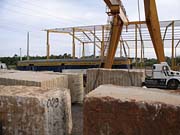

With easy access to Brazil's main highways, railways and a location near the vast port complex of Vitoria, Serra is well situated for international trade. And its location within the Espirito Santo places it within easy driving distance of many of Brazil's most popular quarry sites. Other stone-producing areas within Brazil, such as Belo Horizonte and Minas Gerais, are reachable via direct railway for efficent block transport.
According to the local government in Serra, a total of 110 companies have established operations in the city over the past five years, including many producers of stone and related sectors such as abrasives, grits and transport.
Within the City of Serra, there are several different districts. The Jacui area, for example, is home to branches of several stone companies that are headquartered overseas, such as Dorking and Eurobrasil. And presently, the Spanish stone company Levantina is building "Levantina de Granitos do Brazil" there. The factory is being built on a 130,000-square-meter piece of land, and it will begin with three gangsaws and a polishing machine made in Italy. The cost of property in the Jacui region is quite low, however, the infrastructure is still developing. While the electrical requirements of the area are currently being satisfied, the secondary roads are still in need of an upgrade. This, however, is expected to occur shortly as more companies move into the area.
Another neighborhood is the Civit area -- a more developed area that is home to block processors such as Andrade S/A and Vitoria Stone. Both of these firms are equipped with state-of-the-art block processing equipment from Italy.
Companies starting a stoneworking firm in Brazil also have the option of establishing themselves in managed developments in Serra, such as TIMS. A branch of the large engineering firm, Andrade Guiterrez, TIMS represents a large industrial park where all of the infrastructure and logistics of an operation -- such as roads, railways, electricity, security, etc -- are centrally managed. In addition to firms such as a multi-national pharmaceutical pro-ducer, international stoneworking companies such as Cava have established operations on TIMS property, shipping finished products around the world.